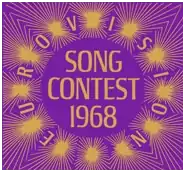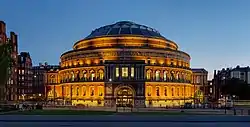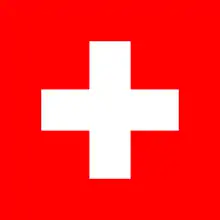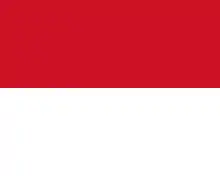Eurovision Song Contest 1968
The Eurovision Song Contest 1968 was the 13th edition of the annual Eurovision Song Contest. It took place in London, United Kingdom, following Sandie Shaw's win at the 1967 contest in Vienna, Austria, with the song "Puppet on a String". It was the third time the event took place in the UK; after the 1960 and 1963 editions, both of which also took place in London. The contest was held at the Royal Albert Hall on Saturday 6 April 1968, and was hosted by Katie Boyle (for the third time). Seventeen countries participated in the contest.
| Eurovision Song Contest 1968 | |
|---|---|
 | |
| Dates | |
| Grand final | 6 April 1968 |
| Host | |
| Venue | Royal Albert Hall London, United Kingdom |
| Presenter(s) | Katie Boyle |
| Musical director | Norrie Paramor |
| Directed by | Stewart Morris |
| Executive supervisor | Clifford Brown |
| Executive producer | Tom Sloan |
| Host broadcaster | British Broadcasting Corporation (BBC) |
| Interval act | Impressions from London |
| Website | eurovision |
| Participants | |
| Number of entries | 17 |
| Debuting countries | None |
| Returning countries | None |
| Non-returning countries | None |
Participation map
| |
| Vote | |
| Voting system | Ten-member juries distributed ten points among their favourite songs. |
| Nul points | None |
| Winning song | "La, la, la" |
The winner was Spain with the song "La, la, la", performed by Massiel, and written/composed by Manuel de la Calva and Ramón Arcusa. This was Spain's first victory - and their first ever top five placing - in the contest. This was also first victory for the country from the Iberian Peninsula.
Prior to the contest, the United Kingdom's entry, Cliff Richard with the song "Congratulations", was hotly tipped as the favourite to win, but lost out to Spain's Massiel by a margin of just one point. Originally Spain entered Joan Manuel Serrat to sing "La La La", but his demand to sing in Catalan was an affront to the Francoist State dictatorship. Serrat was replaced by Massiel, who sang the same song in Spanish.[1]
Location

The contest was held at the Royal Albert Hall in London. The Royal Albert Hall is known for hosting the world's leading artists from several performance genres, sports, award ceremonies, the annual summer Proms concerts and other events since its opening in 1871, and has become one of the United Kingdom's most treasured and distinctive buildings.
Format
1968 was the first time that the Eurovision Song Contest was broadcast in colour. The countries that broadcast it in colour were France, Germany, the Netherlands, Norway, Switzerland, Sweden and the United Kingdom, although in the UK it was broadcast as an encore presentation in colour on BBC Two the next day. Also all of Eastern Europe and Tunisia broadcast the contest. Katie Boyle hosted the contest for a third time.[1]
Vote rigging allegations
In May 2008, a documentary by Spanish film-maker Montse Fernández Villa, 1968. Yo viví el mayo español, centred on the effects of May 1968 in Francoist Spain,[2] and alleged that the 1968 Eurovision Song Contest was rigged by the Spanish caudillo Francisco Franco, who would have sent state television officials across Europe offering cash and promising to buy television series and contract unknown artists.[3] The allegation was based on a testimony by journalist José María Íñigo, a TVE employee at the time, who claimed the rigging was common knowledge and suggested that Spanish record label representatives offered to release albums by Bulgarian and Czech artists (neither Bulgaria nor Czechoslovakia were members of the European Broadcasting Union at the time, though in the 1968 Contest, Austria was represented by Karel Gott, who was from Czechoslovakia.).[4]
The documentary claimed that the contest should in fact have been won by the United Kingdom's entry – "Congratulations" performed by Cliff Richard – which finished second by one vote.[5] Massiel, the performer of the winning entry, was outraged by the allegations, and claimed that if there had been fixes, "other singers, who were more keen on Francoist Spain, would have benefited". José María Iñigo, author of the statement in the documentary, personally apologized to Massiel and said that he had repeated a widespread rumour. Both Massiel and Iñigo accused television channel La Sexta, broadcaster of the documentary, of manufacturing the scandal.[6]
Participating countries
All countries that participated in 1967 also participated in 1968.[1]
Conductors
Each performance had a maestro who conducted the orchestra.[7][8]
 Portugal – Joaquim Luís Gomes
Portugal – Joaquim Luís Gomes Netherlands – Dolf van der Linden
Netherlands – Dolf van der Linden.svg.png.webp) Belgium – Henri Segers
Belgium – Henri Segers Austria – Robert Opratko
Austria – Robert Opratko Luxembourg – André Borly
Luxembourg – André Borly Switzerland – Mario Robbiani
Switzerland – Mario Robbiani Monaco – Michel Colombier
Monaco – Michel Colombier Sweden – Mats Olsson
Sweden – Mats Olsson Finland – Ossi Runne
Finland – Ossi Runne France – Alain Goraguer
France – Alain Goraguer Italy – Giancarlo Chiaramello
Italy – Giancarlo Chiaramello United Kingdom – Norrie Paramor
United Kingdom – Norrie Paramor Norway – Øivind Bergh
Norway – Øivind Bergh Ireland – Noel Kelehan
Ireland – Noel Kelehan.svg.png.webp) Spain – Rafael Ibarbia
Spain – Rafael Ibarbia Germany – Horst Jankowski
Germany – Horst Jankowski.svg.png.webp) Yugoslavia – Miljenko Prohaska
Yugoslavia – Miljenko Prohaska
Returning artists
Only one artist returned in this year's contest. The winner of the 1962 contest, Isabelle Aubret, returned once more for France.[1]
Results
Scoreboard
Due to a misunderstanding by the hostess, Katie Boyle, Switzerland were erroneously awarded 3 points by Yugoslavia, instead of 2. The scrutineer asked for the Yugoslav votes from TV Skopje to be announced a second time.
| Results | |||||||||||||||||||
|---|---|---|---|---|---|---|---|---|---|---|---|---|---|---|---|---|---|---|---|
| Portugal | 5 | 2 | 3 | ||||||||||||||||
| Netherlands | 1 | 1 | |||||||||||||||||
| Belgium | 8 | 1 | 1 | 1 | 3 | 1 | 1 | ||||||||||||
| Austria | 2 | 2 | |||||||||||||||||
| Luxembourg | 5 | 1 | 1 | 1 | 1 | 1 | |||||||||||||
| Switzerland | 2 | 2 | |||||||||||||||||
| Monaco | 8 | 2 | 1 | 3 | 1 | 1 | |||||||||||||
| Sweden | 15 | 1 | 1 | 1 | 2 | 6 | 4 | ||||||||||||
| Finland | 1 | 1 | |||||||||||||||||
| France | 20 | 3 | 6 | 2 | 3 | 3 | 1 | 2 | |||||||||||
| Italy | 7 | 1 | 2 | 2 | 2 | ||||||||||||||
| United Kingdom | 28 | 1 | 2 | 2 | 1 | 4 | 5 | 3 | 2 | 4 | 1 | 1 | 2 | ||||||
| Norway | 2 | 1 | 1 | ||||||||||||||||
| Ireland | 18 | 1 | 1 | 1 | 4 | 1 | 4 | 6 | |||||||||||
| Spain | 29 | 4 | 2 | 1 | 4 | 3 | 4 | 3 | 1 | 1 | 6 | ||||||||
| Germany | 11 | 1 | 1 | 2 | 5 | 2 | |||||||||||||
| Yugoslavia | 8 | 1 | 1 | 1 | 1 | 3 | 1 | ||||||||||||
Broadcasters, commentators and spokespersons
Spokespersons
Listed below is the order in which votes were cast during the 1968 contest along with the spokesperson who was responsible for announcing the votes for their respective country.[11]
 Portugal – Maria Manuela Furtado
Portugal – Maria Manuela Furtado Netherlands – Warry van Kampen[12]
Netherlands – Warry van Kampen[12].svg.png.webp) Belgium – André Hagon
Belgium – André Hagon Austria – Walter Richard Langer
Austria – Walter Richard Langer Luxembourg – TBC
Luxembourg – TBC Switzerland – Alexandre Burger
Switzerland – Alexandre Burger Monaco – TBC
Monaco – TBC Sweden – Edvard Matz[13]
Sweden – Edvard Matz[13] Finland – Poppe Berg[14]
Finland – Poppe Berg[14] France – Jean-Claude Massoulier[15]
France – Jean-Claude Massoulier[15] Italy – Mike Bongiorno
Italy – Mike Bongiorno United Kingdom – Michael Aspel[8]
United Kingdom – Michael Aspel[8] Norway – Sverre Christophersen[16]
Norway – Sverre Christophersen[16] Ireland – Gay Byrne
Ireland – Gay Byrne.svg.png.webp) Spain – Ramón Rivera
Spain – Ramón Rivera Germany – Hans-Otto Grünefeldt
Germany – Hans-Otto Grünefeldt.svg.png.webp) Yugoslavia – Snežana Lipkovska-Hadžinaumova
Yugoslavia – Snežana Lipkovska-Hadžinaumova
Broadcasters and commentators
Each national broadcaster also sent a commentator to the contest, in order to provide coverage of the contest in their own native language.
| Country | Broadcaster(s) | Commentator(s) | Ref(s) | |
|---|---|---|---|---|
| Participating countries | ||||
| FS1 | Willy Kralik | |||
| RTB | French: Paule Herreman | |||
| BRT | Dutch: Herman Verelst | [11] | ||
| TV-ohjelma 1 | Aarno Walli | [11] | ||
| Deuxième Chaîne ORTF | Pierre Tchernia | [11][17] | ||
| Deutsches Fernsehen | Hans-Joachim Rauschenbach | [11] | ||
| RTÉ | Brendan O'Reilly | [11] | ||
| RTÉ Radio | Kevin Roche | |||
| Secondo Programma | Renato Tagliani | |||
| Télé-Luxembourg | Jacques Navadic | |||
| Télé Monte Carlo | Pierre Tchernia | |||
| Nederland 1 | Elles Berger | [11] | ||
| NRK | Roald Øyen | [11] | ||
| RTP | Fialho Gouveia | [11] | ||
| Primera Cadena | Federico Gallo | [11] | ||
| Radio Nacional | José María Íñigo | [18] | ||
| Sveriges TV | Christina Hansegård | [11][19] | ||
| TV DRS | German: Theodor Haller | [11] | ||
| TSR | French: Georges Hardy | [11] | ||
| TSI | Italian: Giovanni Bertini | |||
| BBC1 | No commentator | [8] | ||
| BBC Radio 1 and BBC Radio 2 | Pete Murray | [8] | ||
| Televizija Beograd | Serbo-Croatian: Miloje Orlović | |||
| Televizija Zagreb | Serbo-Croatian: Mladen Delić | |||
| Televizija Ljubljana | Slovene: Tomaž Terček | |||
| Non-participating countries | ||||
| BT | Unknown | [8] | ||
| ČST | Unknown | [8] | ||
| Deutscher Fernsehfunk | Unknown | [8] | ||
| RTV | Unknown | [8] | ||
| TVP | Unknown | [8] | ||
| TVR | Unknown | [8] | ||
| CT USSR | Unknown | [8] | ||
| RTT | Unknown | [8] | ||
References
- "Eurovision Song Contest 1968". EBU. Retrieved 16 June 2012.
- "Massiel sí, Madelman no: así fue el Mayo del 68 en España". Público (in Spanish). 3 May 2008. Retrieved 3 December 2009.
- "TVE 'compró' los votos para que Massiel ganará Eurovisión". 20 minutos (in Spanish). 5 May 2008. Retrieved 3 December 2009.
- "Vea el vídeo donde José Maríá Iñigo 'descubre' a Massiel". 20 minutos (in Spanish). 5 May 2008. Retrieved 3 December 2009.
- Govan, Fiona (4 May 2008). "How Franco cheated Cliff out of Eurovision title". The Telegraph. Retrieved 26 April 2012.
- "Massiel e Iñigo acusan a La Sexta de "urdir todo para favorecer a Chiquilicuatre"". El Mundo (in Spanish). 6 May 2008. Retrieved 3 December 2009.
- "And the conductor is..." Retrieved 10 July 2018.
- Roxburgh, Gordon (2012). Songs for Europe: The United Kingdom at the Eurovision Song Contest. Volume One: The 1950s and 1960s. Prestatyn: Telos Publishing. pp. 454–470. ISBN 978-1-84583-065-6.
- "Eurovision Song Contest 1968". The Diggiloo Thrush. Retrieved 4 March 2012.
- "Eurovision Song Contest 1968". 4Lyrics.eu. Retrieved 16 September 2020.
- "Eurovision 1968 - Cast and Crew". IMDb. Retrieved 19 July 2020.
- "Songfestival eindigde in mineur bij BBC", het Parool, 8 April 1968
- Infosajten.com Archived 18 July 2012 at the Wayback Machine
- Selostajat ja taustalaulajat läpi vuosien? (in Finnish) Viisukuppila, 18 April 2005
- Tchernia, Pierre et al. (6 April 1968). 13ème Concours Eurovision de la Chanson 1969 [13th Eurovision Song Contest 1968] (Television production). United Kingdom: BBC, ORTF (commentary).
- Dyrseth, Seppo (OGAE Norway)
- CONCOURS EUROVISION DE LA CHANSON 1968 (in French) SongContest
- Spanish Eurovision commentator José María Iñigo passed away Eurovision.tv
- Thorsson, Leif (2006). Melodifestivalen genom tiderna ["Melodifestivalen through time"]. Stockholm: Premium Publishing AB. p. 74. ISBN 91-89136-29-2.
